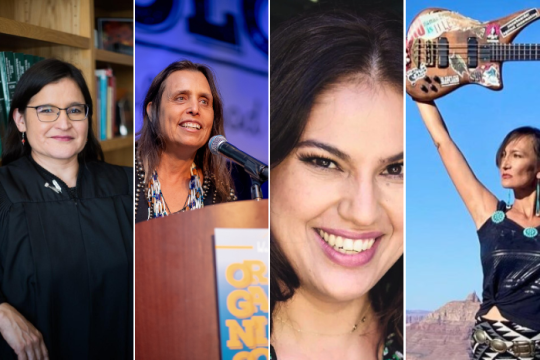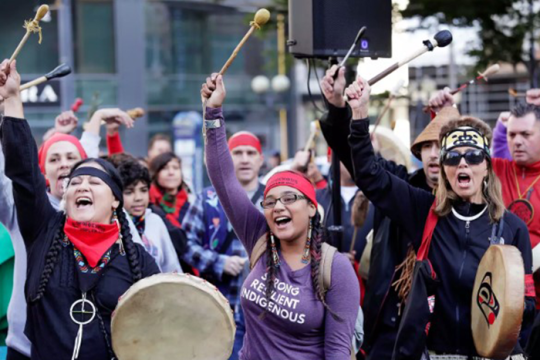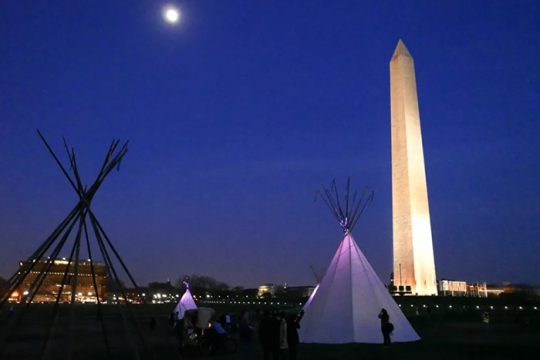As we’ve written about before, the House and Senate are having difficulties reconciling their different visions for the reauthorization of the Violence Against Women Act (VAWA)—which is unprecedented, given that VAWA reauthorization is usually a noncontroversial endeavor. One such area of contention this time around, in addition to ensuring protections for battered immigrant women and LGBT individuals, is the treatment of Native American women – a group that faces a proportionately high level of rape and sexual assault.
The bipartisan Senate version of the bill includes a provision that expands the authority of tribal courts to prosecute non-American Indian perpetrators of sexual crimes. This is an important addition to the bill because it will end impunity for the many perpetrators that are never prosecuted because of the current inefficiencies of the tribal and federal judicial systems. The House version, however, does not include this provision. Supporters of the House version claim that granting such power to tribal courts is a dangerous expansion of authority.
 According to the Department of Justice, an arrest is made in only 13% of sexual assault cases reported by American Indian women nationwide, a percentage much lower than that for African American and white women (35% and 32%, respectively) – and this does not even include the unreported cases.
To compound the situation, the Indian Health Service does not offer rape exams at nearly half of its facilities and lacks the proper resources to treat victims of sexual violence.
The inclusion of the tribal court provision in VAWA is critical to the safety and health of Native American women. As Jews, we are taught that each individual was created in the image of God, yet the House version clearly denies a group of individuals the protection they deserve in the face of violence. We reiterate our call for the House and Senate to agree on a VAWA reauthorization that protects all victims of domestic violence, regardless of race, ethnicity, sexual orientation or immigration status.
According to the Department of Justice, an arrest is made in only 13% of sexual assault cases reported by American Indian women nationwide, a percentage much lower than that for African American and white women (35% and 32%, respectively) – and this does not even include the unreported cases.
To compound the situation, the Indian Health Service does not offer rape exams at nearly half of its facilities and lacks the proper resources to treat victims of sexual violence.
The inclusion of the tribal court provision in VAWA is critical to the safety and health of Native American women. As Jews, we are taught that each individual was created in the image of God, yet the House version clearly denies a group of individuals the protection they deserve in the face of violence. We reiterate our call for the House and Senate to agree on a VAWA reauthorization that protects all victims of domestic violence, regardless of race, ethnicity, sexual orientation or immigration status.
 According to the Department of Justice, an arrest is made in only 13% of sexual assault cases reported by American Indian women nationwide, a percentage much lower than that for African American and white women (35% and 32%, respectively) – and this does not even include the unreported cases.
To compound the situation, the Indian Health Service does not offer rape exams at nearly half of its facilities and lacks the proper resources to treat victims of sexual violence.
The inclusion of the tribal court provision in VAWA is critical to the safety and health of Native American women. As Jews, we are taught that each individual was created in the image of God, yet the House version clearly denies a group of individuals the protection they deserve in the face of violence. We reiterate our call for the House and Senate to agree on a VAWA reauthorization that protects all victims of domestic violence, regardless of race, ethnicity, sexual orientation or immigration status.
According to the Department of Justice, an arrest is made in only 13% of sexual assault cases reported by American Indian women nationwide, a percentage much lower than that for African American and white women (35% and 32%, respectively) – and this does not even include the unreported cases.
To compound the situation, the Indian Health Service does not offer rape exams at nearly half of its facilities and lacks the proper resources to treat victims of sexual violence.
The inclusion of the tribal court provision in VAWA is critical to the safety and health of Native American women. As Jews, we are taught that each individual was created in the image of God, yet the House version clearly denies a group of individuals the protection they deserve in the face of violence. We reiterate our call for the House and Senate to agree on a VAWA reauthorization that protects all victims of domestic violence, regardless of race, ethnicity, sexual orientation or immigration status.Related Posts
Image

Artists, Authors, Activists, and More: Four Inspiring Indigenous Jewish Women
In honor of Native American heritage month, I’m excited to share with you four women whose intersecting Jewish and Indigenous identities have influenced their work as authors, artists, actors, activists, lawyers, and musicians. These women come from a wide array of ages, cultures, and locations; their work speaks to the ways that Jewish values of justice, learning, and belonging overlap with Indigenous culture.
Image

Celebrating the Indigenous Community is a Year-Round Value
One theme central to the month of Kislev is emerging from the struggle to survive. Jewish legend holds that it was in the month of Kislev that a rainbow appeared following the great flood in the time of Noah, that the Mishkan (Tabernacle) was built, and that the foundation stones of the Second Temple were laid.
Image

Native American Heritage Month: Continued Support for the Indigenous Population is a Necessity
In November, we celebrate Native American Heritage Month. Unfortunately, much of North America is just beginning to recognize the contributions of Indigenous peoples.
